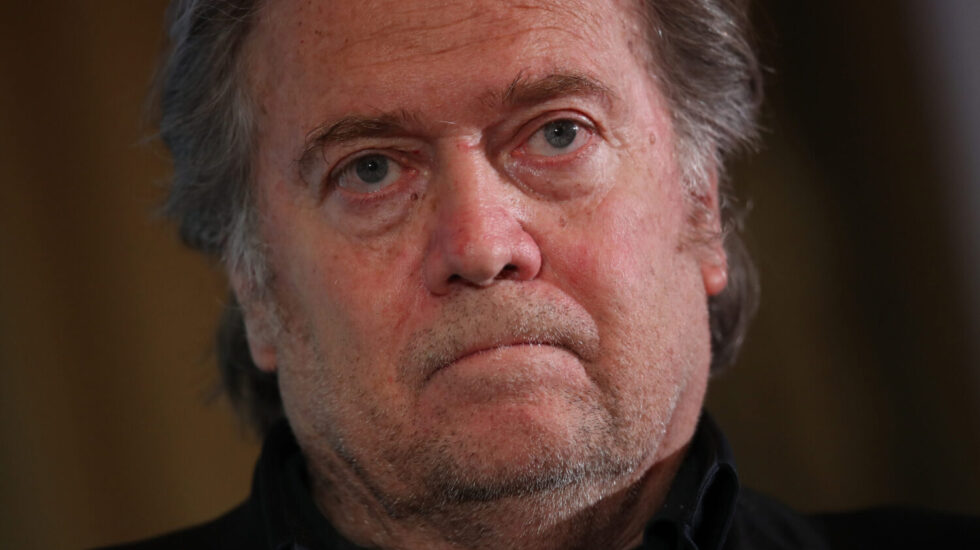Steve Bannon knew that January 6th would be violent; he was in frequent contact with then-President Donald Trump as the events of that dark day were planned; Bannon later refused to answer questions or provide documents to House members investigating the attack on the Capitol; and because of that stonewalling – which he justified with legally dubious claims – lawmakers want him to face contempt of Congress charges, which could result in a $100,000 fine and a year’s imprisonment.
Those are the salient points in a report released Monday evening by the House committee tasked with investigating the events that led to January 6th’s attack on democracy. The committee will vote on recommending contempt charges Tuesday night. If approved, the entire House will then vote on the matter. The Department of Justice would ultimately be responsible for prosecuting Bannon, who has been both a formal and informal advisor to Trump over the past five plus years.
The report explains why investigators want to speak with Bannon, contending that he played “a multi-faceted role in the events of January 6th.” It also highlights public statements Bannon made that suggest he had advanced knowledge of the chaos and destruction planned for that day.
For instance, on January 5th, Bannon told listeners of his radio show that America was experiencing a ‘‘constitutional crisis’’ and ‘‘that crisis is about to go up about five orders of magnitude tomorrow.” Bannon said “All hell is going to break loose tomorrow.” He added:
It’s not going to happen like you think it’s going to happen. OK, it’s going to be quite extraordinarily different. All I can say is, strap in. [. . .] You made this happen and tomorrow it’s game day. So strap in. Let’s get ready.
Bannon continued:
So many people said, ‘‘Man, if I was in a revolution, I would be in Washington.’’ Well, this is your time in history […] It’s all converging, and now we’re on the point of attack tomorrow.
In addition, the report cites journalists’ accounts that “Bannon was in frequent contact with the White House in late-December and early-January and spoke directly with the President several times.” In particular, Bannon urged Trump to ‘‘focus on January 6th.’’ The report continues, “Bannon is reported to have urged then-President Trump to pressure then-Vice President Michael R. Pence to assist in overturning the results of the 2020 election.”
Bannon, according to the report, was also a participant in a “war room” set up at the Willard Hotel in Washington, D.C. that served as base of operations for Trump allies – including lawyer Rudy Giuliani and political operative Roger Stone – as they plotted how to overturn the result of the 2020 presidential election. From the Willard, the report explains, Trump associates pressured members of Congress to vote against certifying the election.
In light of Bannon’s public statements and his close contact with Trump and his inner circle leading up to January 6th, the House committee subpoenaed him for documents and testimony in September.
Bannon – via his lawyer – defied that mandate, explaining that Trump had evoked executive privilege. Bannon said he wouldn’t cooperate with lawmakers until that claim was settled by a court.
The report dismantles that position on a number of fronts, explaining that only the current presidential administration can make executive privilege claims. Besides, the report argues, Congress has an oversight role that overwhelms even legitimate claims of executive privilege. It also points out that Bannon was not a White House or government employee during the time period they’re investigating, so privilege is moot. In addition, the report argues, even if Trump did have executive privilege that wouldn’t block Bannon from answering questions about his radio show or other actions related to January 6th that didn’t involve the former president.
The report also points out that Trump had never formally invoked executive privilege when Bannon defied the Congressional subpoenas.
It wasn’t until Monday – after Bannon ignored deadlines for testimony and documents – that Trump filed a lawsuit trying to prevent the committee from obtaining what he called privileged information.
Many legal experts think Trump’s claim is without merit. But that’s likely besides the point. His lawsuit may delay the committee’s investigation long enough to prevent damaging information from coming out for years.



